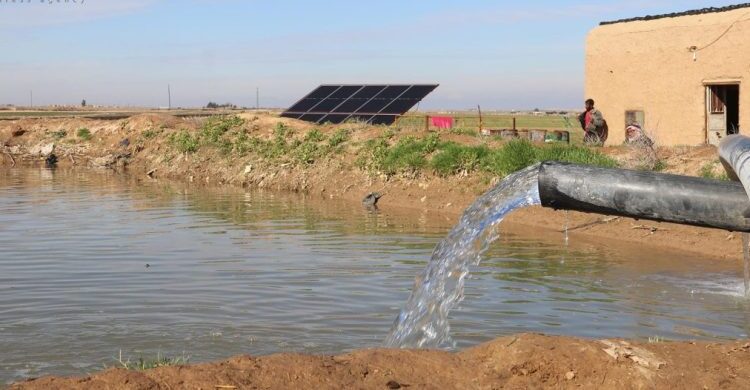Omar Kheder, farmer from Hasakah Governorate, northeast Syria, resorted to install 30 solar panels to operate a pump that extracts groundwater to irrigate his wheat and barley crops. Due to fuel shortage and high prices of diesel, the farmer stopped using diesel-based power generators.
Across the farmlands in areas in northeast Syria, where agriculture takes the top spot, installing solar panels have become the best option for farmers to irrigate their crops amid fuel and power shortages.
“The main source of our income depends on agriculture. So, we installed solar panels after challenges in securing fuel,” Kheder, from the village of Umm al-Masamir, west of Hasakah, said.
Kheder’s diesel-powered generator is discontinued in his courtyard, and the thirty-year-old farmer noted that using solar energy is a good alternative option and meets the electricity needs even in winter.
Recently, farmers have used water pumps powered by generators for irrigating their crops, but fuel shortages and price hikes, as a litre of diesel costs over 4,000 SYP (about $0,35), led them to seek alternative solutions.
Syria has faced a decline in rainfall in recent years, forcing farmers to use solar energy due to reduction of rainfed lands and reliance on irrigated lands.
However, installing solar panels for an agricultural project is not an easy choice for a wide segment of farmers due to their high costs amid the harsh economic crisis facing the country.
Kheder explained that last year he sold a space of his land which amounted to 8.6 acres to buy solar panels costing $185 for each panel in order to irrigate 24.7 acres.
Several kilometers away from Umm al-Masamir, farmer Muhammad al-Fattah installed 10 solar panels about two years ago, at a cost of $1,700. He has not paid the remaining amount of its cost which is $400 yet, according to the farmer.
“I bought the solar panels to power the pump dedicated for irrigating around 1.2 acres of land for a cotton crop and about 2.4 acres for wheat and barley annually,” al-Fattah told North Press.
The fifty-year-old farmer noted that solar energy provided him with significant relief after struggling with traditional irrigation by using power generators.
“The problems increased due to using generators because of the difficulty of securing diesel and its high price in addition to the high cost of repairing breakdowns and maintenance matters,” al-Fattah added.
Increase in Demand
Areas-held by the Autonomous Administration of North and East Syria (AANES) witness a widespread proliferation of stores selling solar panels due to an increasing demand for them.
The percentage of purchasing solar panels, whether for household or agricultural purposes, has risen by about 40 percent over the past year compared to the previous one, according to Jamil Hisso, owner of a solar panels company in Hasakah.
Hisso said that people resorted to solar energy due to the rise in fuel prices since it has been a consumable and non-renewable substance, while the expected lifespan of solar panels is approximately 20 years.
Hisso told North Press that business currently in winter experiences a slump in sales but it thrives in summer, attributing this to farmers having more financial liquidity in summer to buy solar panels after obtaining crop revenues.
Preparing Studies
The Agriculture and Irrigation Board, affiliated with the AANES, held a dialogue forum earlier in 2024 regarding the agricultural reality amid climate change affecting northeast Syria.
One of the final recommendations of the forum called for encouraging the use of solar energy and adopting modern irrigation methods.
Mehran Ahmad, Co-chair of the Agriculture and Irrigation Board, stated that they have conducted several studies regarding solar energy to generalize them in the future for agricultural projects in northeastern Syria.
“Alternative energy is important in agricultural projects, notably in reducing production costs for farmers, increasing irrigated areas, introducing new crop varieties in agricultural processes that require large amounts of water, and reducing environmental pollution caused by diesel engines used in irrigation farmlands,” Ahmad told North Press.

